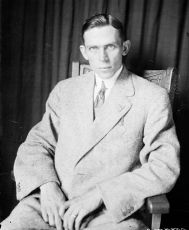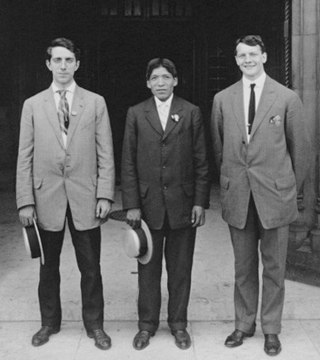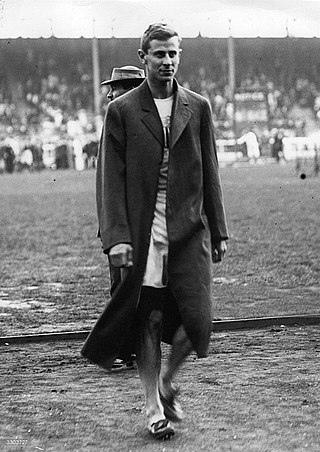
Melvin Whinfield "Peerless Mel" Sheppard was an American athlete, member of the Irish American Athletic Club, and winner of four gold medals and one silver medal at the 1908 Summer Olympics and 1912 Summer Olympics. Along with Henry Taylor of the United Kingdom, he was the most successful athlete at the 1908 Olympics.
The men's 100 metres was the shortest of the sprint races at the 1908 Summer Olympics in London. The competition was held over the course of three days. The first round was held on 20 July, the semifinals on 21 July, and the final on 22 July. NOCs could enter up to 12 athletes, The event was won by Reggie Walker of South Africa, the first time the gold medal went to a nation other than the United States. The Americans did stay on the podium with James Rector's silver medal. Canada won its first medal in the event, a bronze by Robert Kerr.

Nathaniel John Cartmell, also known as Nat and Nate, was an American athlete who won medals at two editions of the Olympic Games. Importantly, Nate was on first racially integrated Men's Medley relay team that won Olympic gold medal at the 1908 London Olympics, which Nate helped form and featured Nate's fellow University of Pennsylvania alumnus and former teammate, Dr. John Baxter Taylor Jr., the first black athlete in America to win a gold medal in the Olympics. Nate is also known for being the first head coach of the North Carolina Tar Heels men's basketball team

Robert Cloughen was an American athlete, a member of the Irish American Athletic Club, and a member of the 1908 U.S. Olympic team. His father, John, was the fifth Manhattan Borough president in 1909 and also New York City's Commissioner of Public Works.
The men's 400 metres was an Olympic event for the fourth time at the 1908 Summer Olympics in London. The competition was held from 21 July 1908, to 23 July 1908. The rerun of the final was held on 25 July 1908. The races were held on a track of 536.45 metres=1⁄3 mile in circumference.

John Baxter Taylor Jr. was an American track and field athlete, notable as the first African American to win an Olympic gold medal.

William Corbett Robbins was an American athlete and a member of the Irish American Athletic Club. He was born in Cambridge, Massachusetts. In 1908, he was involved in a controversial race in the final of the Men's 400 metres and was later part of a team which broke the world's record for the one mile relay.

John Condict Carpenter was an American sprinter. He competed at the 1908 Summer Olympics in London, contributing to one of the many sporting controversies of the 1908 Games.
The men's 800 metres made its fourth Olympic appearance at the 1908 Summer Olympics. The competition was held on July 20, 1908, and on July 21, 1908. The races were held on a track of 536.45 metres=1⁄3 mile in circumference. It was run in two rounds, with the winners of the eight heats of the first round competing in the final.

Emilio Lunghi was an Italian athlete. He won the silver medal in the men's 800 metres race at the 1908 Summer Olympics in London, making him the first Italian to win an Olympic medal.

Hanns Braun was a German athlete.
The men's 1500 metres was an Olympic event for the fourth time at the 1908 Summer Olympics. The competition was held on July 13, 1908, and on July 14, 1908. The races were held on a track of 536.45 metres=1⁄3 mile in circumference. The event was won by Mel Sheppard of the United States, the second consecutive Games an American had won the event. Sheppard, like Jim Lightbody in 1904, would also win the 800 metres for a middle-distance double.

Norman Frederic Hallows was an English middle-distance runner. Educated at Felsted School, he won the bronze medal and set an Olympic record in the 1500 metres race at the 1908 Summer Olympics in London. His time in the first round was 4:03.4, beating the Olympic record set by American Mel Sheppard only minutes earlier by 1.6 seconds. In the final, Sheppard matched Hallows' first round time while Hallows finished in third place at 4:04.0.

William Franklin "Red" Hamilton was an American sprinter who competed at the 1908 Summer Olympics in London.
James Frederick Lintott was a British athlete. He competed in the 1908 Summer Olympics in London.
Robert Irving Parkes was a Canadian athlete. He competed in the 1908 Summer Olympics in London.
John William Lee was a British athlete. He competed in the 1908 Summer Olympics in London. He was affiliated with Heaton Harriers, a Newcastle upon Tyne-based club.

James Patrick Sullivan was an American middle-distance runner and member of the Irish American Athletic Club. He competed in the 1906 Intercalated Games in Athens and the 1908 Summer Olympics in London.

The men's 800 metres was a track and field athletics event held as part of the athletics at the 1912 Summer Olympics programme. It was the fifth appearance of the event, which is one of 12 athletics events to have been held at every Summer Olympics. The competition was held from Saturday, July 6, 1912, to Monday, July 8, 1912. Forty-seven runners from 16 nations competed. NOCs could enter up to 12 athletes. The event was won by Ted Meredith of the United States, the nation's third consecutive victory in the 800 metres. Mel Sheppard became the first man to win two medals in the event, coming in second to miss out on defending his 1908 gold. Ira Davenport completed the United States sweep, the second time the Americans had swept the 800 metres podium.

The men's 1500 metres was a track and field athletics event held as part of the athletics at the 1912 Summer Olympics programme. The competition was held on Tuesday, July 9, 1912, and on Wednesday, July 10, 1912. Forty-five runners from 14 nations competed, including the Olympic champion from 1908, Mel Sheppard. NOCs could enter up to 12 athletes.












